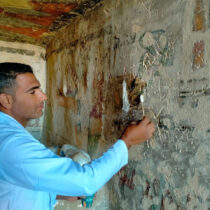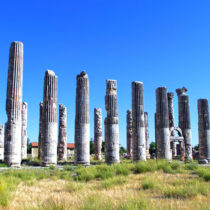Fragmentary surviving scrolls, originated from Qumran and said to be stored in a Swiss safe deposit, are to be marketed by members of a Palestinian family of antiquity dealers who originally had sold to scholars part of the famous lot of manuscripts now known as the Dead Sea Scrolls.
Most of these scraps are barely postage-stamp-sized, and some are blank. Still, they have been key to a conflict between the Israel Antiquities Authority, who recognises them as state cultural property, and a group of American Evangelical Christan collectors and institutions who wish to purchase them.
According to William Kando, a member of the antiquity dealing family, his kinsmen had offered to sell the fragmentary scrolls to the antiquities authority and other Israeli institutions, but they could not afford them.”If anyone is interested, we are ready to sell,” Kando told The Associated Press, sitting in the Jerusalem antiquities shop he inherited from his late father.
“I told Kando many years ago, as far as I’m concerned, he can die with those scrolls,” said Amir Ganor, head of the authority’s anti-looting squad.
The scrolls’ ownership is a complex case with elements of a political thriller. Israel considers the scrolls its national patrimony, and says all fragments should be in its large repository for best preservation and research. The Palestinian Authority claim rights to the material because it was found in today’s West Bank, while Jordan claims rights because the material was discovered when it ruled the territory. Meanwhile, the Kando family has managed to use loopholes -caused by the political instabitily in the area and a vacuum in international laws- to push scroll fragments to the market, so that they are purchased by museums, universities and collectors outside the Holy Land.
Kando would not say how many more fragments are in his family’s collection. But since 1995, Israeli officials have been keeping tabs on his attempted sales – and the correspondence of dealers and middlemen – in an effort to determine what Dead Sea Scrolls his family has left. They estimate that the Kandos are still holding onto around 20 fragments.




